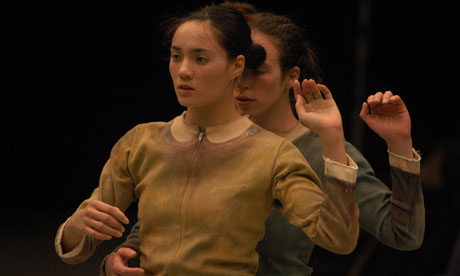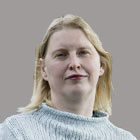The Israeli contemporary dance company's performance had hundreds of shouting protesters outside and was continually disrupted
Batsheva dance group: my deep shame at this bigoted festival protest
The Israeli contemporary dance company's performance had hundreds of shouting protesters outside and was continually disrupted

In the line of fire: the Batsheva Dance Company performs by Mamoot by Gadi Dagon
Batsheva, the Israeli contemporary dance group,
should have been one of the hits of this year's Edinburgh international
festival. They got five-star reviews for their witty, sexy and creative
show.
As Batsheva are an ethnically mixed group of performers who danced to a "mash up" including the Star Wars theme and Wagner and who, at home, have incurred the wrath of the Orthodox community for a routine involving them stripping off to a Passover song, it would seem bizarre to hold them responsible for any Israeli government policies. Surely it would make as much sense to blame the ballerinas of the Mariinsky (formerly the Kirov) for Putin's human rights abuses. Indeed, Batsheva's choreographer, Ohad Naharin, has said he is "in disagreement" with his government whereas the prima ballerina of the Mariinsky, Diana Vishneva, has maintained a studied silence over the fate of Pussy Riot.
But while Mariinsky played a sumptuous Cinderella at the Festival theatre to sell out audiences, with a line of chauffeur-driven cars waiting outside to pick up dignitaries, including government ministers, the Batsheva had a very different fate. Their show played to half-empty houses and was continually disrupted inside the theatre. It was a tense and nervous – if well-coiffed in shades of grey – Edinburgh contemporary dance audience that made it into the foyer through the hundreds of shouting demonstrators taking up most of the pavement outside.
The night I was there, the show was stopped three times; the next night it was four. As an audience member, I must confess I felt alarmed and vulnerable. I didn't know what was about to happen. The 82-year-old Dutchman next to me patted my arm and murmured: "This is not Kristallnacht. I remember that"
Despite the courage and professionalism of the performers on stage it must have been a nerve-racking gig for them; in other countries protesters have remained outside the theatre. No one was arrested for any of the disruptions, the Scottish police taking the view that it was not illegal.
The dancers were being held responsible for the situation of Palestinians on the West Bank and in Gaza on the very thin grounds that their work had been praised by the Israeli government and they take government money – both things that apply to the Mariinsky.
A group of Scottish writers headed by Scotland's national poet Liz Lochhead (who has also taken government money on occasion) even wrote to the press calling for a cultural boycott of all Israeli companies and artists. This was what was effectively being imposed on the rest of us by the pickets outside.
I felt personally deeply ashamed and upset that these renowned international artists who were visiting the EIF were unable to perform their show in peace. I have spent the last year researching a book (Confusion to Our Enemies: Selected Journalism of Arnold Kemp; Arnold was my father). In the course of that, I read up on the work of my grandfather Robert Kemp – he was one of the founders of the Edinburgh festival and coined the term the fringe.
It was started in the aftermath of the Second World War, to bring back the joy, colour and vibrancy of cultural expression into people's lives, lives that for the most part had been grey and miserable. It was started so that people from different countries could communicate heart to heart in the international language of art and culture.
It would be a tragedy if people who live, not in the shadow of war but in relative ease and comfort, manage to achieve their wish and create a cultural climate in Scotland where it is impossible for artists to perform because of the passports they hold.
This article will be opened to comments on Sunday morning
As Batsheva are an ethnically mixed group of performers who danced to a "mash up" including the Star Wars theme and Wagner and who, at home, have incurred the wrath of the Orthodox community for a routine involving them stripping off to a Passover song, it would seem bizarre to hold them responsible for any Israeli government policies. Surely it would make as much sense to blame the ballerinas of the Mariinsky (formerly the Kirov) for Putin's human rights abuses. Indeed, Batsheva's choreographer, Ohad Naharin, has said he is "in disagreement" with his government whereas the prima ballerina of the Mariinsky, Diana Vishneva, has maintained a studied silence over the fate of Pussy Riot.
But while Mariinsky played a sumptuous Cinderella at the Festival theatre to sell out audiences, with a line of chauffeur-driven cars waiting outside to pick up dignitaries, including government ministers, the Batsheva had a very different fate. Their show played to half-empty houses and was continually disrupted inside the theatre. It was a tense and nervous – if well-coiffed in shades of grey – Edinburgh contemporary dance audience that made it into the foyer through the hundreds of shouting demonstrators taking up most of the pavement outside.
The night I was there, the show was stopped three times; the next night it was four. As an audience member, I must confess I felt alarmed and vulnerable. I didn't know what was about to happen. The 82-year-old Dutchman next to me patted my arm and murmured: "This is not Kristallnacht. I remember that"
Despite the courage and professionalism of the performers on stage it must have been a nerve-racking gig for them; in other countries protesters have remained outside the theatre. No one was arrested for any of the disruptions, the Scottish police taking the view that it was not illegal.
The dancers were being held responsible for the situation of Palestinians on the West Bank and in Gaza on the very thin grounds that their work had been praised by the Israeli government and they take government money – both things that apply to the Mariinsky.
A group of Scottish writers headed by Scotland's national poet Liz Lochhead (who has also taken government money on occasion) even wrote to the press calling for a cultural boycott of all Israeli companies and artists. This was what was effectively being imposed on the rest of us by the pickets outside.
I felt personally deeply ashamed and upset that these renowned international artists who were visiting the EIF were unable to perform their show in peace. I have spent the last year researching a book (Confusion to Our Enemies: Selected Journalism of Arnold Kemp; Arnold was my father). In the course of that, I read up on the work of my grandfather Robert Kemp – he was one of the founders of the Edinburgh festival and coined the term the fringe.
It was started in the aftermath of the Second World War, to bring back the joy, colour and vibrancy of cultural expression into people's lives, lives that for the most part had been grey and miserable. It was started so that people from different countries could communicate heart to heart in the international language of art and culture.
It would be a tragedy if people who live, not in the shadow of war but in relative ease and comfort, manage to achieve their wish and create a cultural climate in Scotland where it is impossible for artists to perform because of the passports they hold.
This article will be opened to comments on Sunday morning

No comments:
Post a Comment